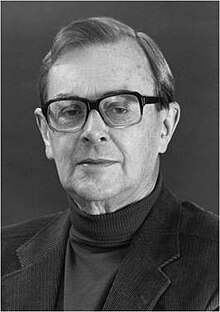Brian Pippard
| Brian Pippard | |
|---|---|

Brian Pippard
|
|
| Born |
7 September 1920 Earl's Court, London |
| Died | 21 September 2008 (aged 88) Cambridge |
| Institutions | University of Cambridge |
| Notable students |
Brian David Josephson John Shepherd |
| Notable awards |
Fellow of the Royal Society Hughes Medal (1960) |
Sir Alfred Brian Pippard, FRS (7 September 1920 – 21 September 2008), was a British physicist. He was Cavendish Professor of Physics from 1971 until 1984 and an Honorary Fellow of Clare Hall, Cambridge, of which he was the first President. He was educated at Clifton College.
Pippard demonstrated the reality, as opposed to the mere abstract concept, of Fermi surfaces in metals by establishing the shape of the Fermi surface of copper through measuring the reflection and absorption of microwave electromagnetic radiation (see the anomalous skin effect). He also introduced the notion of coherence length in superconductors in his proposal for the non-local generalisation of the Londons' equations concerning electrodynamics in superfluids and superconductors. The non-local kernel proposed by Pippard, inferred on the basis of Chambers' non-local generalisation of Ohm's law) can be deduced within the framework of the BCS (Bardeen, Cooper and Schrieffer) theory of superconductivity (a comprehensive description of the details of the London-Pippard theory can be found in the book by Fetter and Walecka).
Pippard was the author of Elements of Classical Thermodynamics for Advanced Students of Physics,Dynamics of Conduction Electrons, and The Physics of Vibration. He is also a co-author of the three-volumes encyclopaedia Twentieth Century Physics. As the Cavendish Professor of Physics at Cavendish Laboratory, University of Cambridge, he complied Cavendish Problems in Classical Physics, based in large part on past examination questions for Cambridge physics students.
...
Wikipedia
